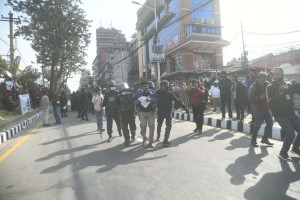Editorial
Welcome first step
A timely budget is only the first step in boosting the govt’s spending capacity
The timely endorsement of the Appropriation Bill for the new fiscal year due to begin next week has raised hope that development spending will increase significantly. This is the first time in 15 years that the government has the authority to spend without introducing a Cash Advance Bill. Nepal’s budgetary process had gone haywire since 2000 as political polarisation and a deepening Maoist conflict gave rise to protracted political instability. That year, the then Finance Minister Mahesh Acharya, in the Girija Prasad Koirala government, was able to get the budget endorsed in time. Since then, subsequent finance ministers have been forced to contend with a one-third Cash Advance Bill to keep the government funded as parties wrangled and made the budgetary process hostage to myopic politicking.
There have been as many as 16 governments in the last 15 years. In most instances, a government came and fell right before or after the budget session. This contributed to a serious lack of ownership over the budgetary process. The opposition obstructed the budget session in the hope of coming to power. A government that saw signs of being toppled made no serious efforts to present the budget on time.
The cumulative effect of delayed budgets on development activities has been very damaging. This meant projects were not implemented according to plan, leading to cost overruns. It also inculcated an adverse culture among contractors to intentionally delay implementation and demand variation cost to increase profit margins.
With the endorsement of the Appropriation Bill, the government now has the authority to spend from the next fiscal year’s budget. The government has also recently amended the Public Procurement Act (PPA) to streamline the purchase of goods and services and make the process shorter, simpler and more coherent. The new PPA no longer has the provision of awarding a contract to the lowest bidder if it is deemed too low to be viable. The new Act also has a provision of penalising contractors for non-performance.
Together with the reform in the procurement process, the signs of normalcy in the budgetary process are a welcome development. This was possible largely because of the constitutional stipulation of a fixed date for budget presentation. In principle, the government can now begin the tender and procurement process of goods and services from day one of the new fiscal year. But it is not that simple. A detailed programme with a timeline and budget will have to be approved by the National Planning Commission (NPC) before ministries and departments can start the procurement process. The NPC is yet to receive detailed programmes from line ministries. Its officials say that there could be delays on this front. The other area of concern is the appointment of project chiefs and their high turnover. Without competence and stability at the top of big infrastructural projects, a timely budget alone cannot perform any magic. Some degree of coherence and discipline has to be brought into how project chiefs are appointed. There needs to be a transparent guideline on who can head big projects. A timely budget is only the beginning of a process to boost the government’s spending capacity.




 16.09°C Kathmandu
16.09°C Kathmandu














